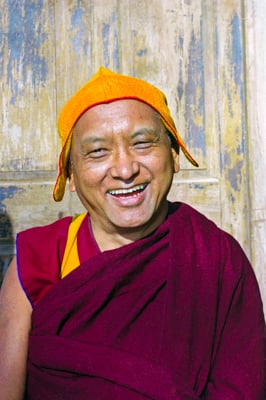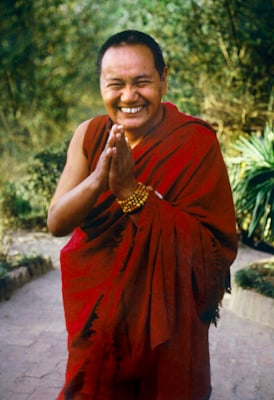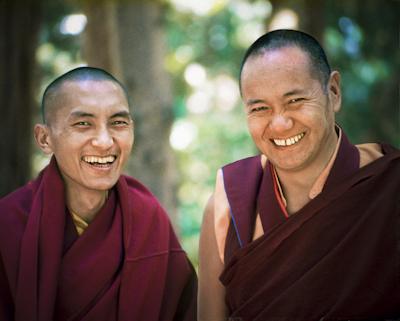Dear LYWA friends and supporters,
Thank you so much for your interest in and support of the Lama Yeshe Wisdom Archive. We take this opportunity to wish you all the best for the holiday season and the new year. May all sentient beings be enlightened soon!
Update on Our Year-End Appeal
Thank you so much if you have already contributed to our very important year-end appeal. As we have told you, we're gearing up for a big 2012 and really need all the support we can get. To date we have raised nearly $20,000 towards our $50,000 goal.
Join our group of kind-hearted benefactors and members in supporting the ever-flowing nectar of Dharma teachings that the Archive provides.
If you have not yet donated, please do so now. We can only make the Dharma available worldwide with your support.
What's New On Our Website
 We have just posted a letter from Lama Zopa Rinpoche to a student who is asking Rinpoche how he could end self-destructive habits and lead a more stable and happy life. Rinpoche begins his reply with:
We have just posted a letter from Lama Zopa Rinpoche to a student who is asking Rinpoche how he could end self-destructive habits and lead a more stable and happy life. Rinpoche begins his reply with:
"Thank you very much for your kind letter. You mentioned a self-destructive habit and other things, however this can definitely be changed. It can definitely be changed by looking at the mistakes and shortcomings of such a habit. Look at the harm to yourself and to other sentient beings, and the benefit of not doing those things.
"Instead, think more about bringing benefit to other sentient beings for all their future lives and their happiness; then you can change."
Read the remainder of Rinpoche's reply where he gives an long teaching on the emptiness of the I.
There is also new advice from Rinpoche on practices one can do to reduce obstacles to finding a job, and a short advice to a nun in retreat.
These are only a few of the many new advices posted to the Online Advice Book this month; you can see a list of all the new postings here.
Ebook Spotlight: Daily Purification
 Lama Zopa Rinpoche's pocket-sized practice booklet Daily Purification: A Short Vajrasattva Practice is available as an ebook for your Kindle, Nook, iPhone and more. Just visit our online store to access links to the various vendors that carry the ebook.
Lama Zopa Rinpoche's pocket-sized practice booklet Daily Purification: A Short Vajrasattva Practice is available as an ebook for your Kindle, Nook, iPhone and more. Just visit our online store to access links to the various vendors that carry the ebook.
As it says in the Editor's Introduction of the book:
Out of his great compassion, Lama Zopa Rinpoche has composed this short Vajrasattva practice and requested that it be published in a pocket-sized format that is easy for people to carry around and have available at all times. Thus, we can be like the great Atisha -- whenever we notice we have broken a vow or created any other kind of negative karma, we can whip out our little Vajrasattva book and purify that negativity with the four opponent powers without a second's delay.
Now you can whip out your smartphone and do the same.
Call for Volunteers
We have been very fortunate over the years to have the assistance of many volunteers who have offered so much, from office help, to technology upgrades, to fundraising. We are so grateful for all the ways we are supported by our friends in the Dharma community. In the next few months we could use help with:
-
Filemaker database design
-
OCR scanning
-
A traveller going from USA to France to take some of Lama Yeshe’s holy ashes to Nalanda
If you are able to help us with any of the above, please contact Jen Barlow.
We leave you with a teaching that is Lama Yeshe's only remaining unpublished Christmas talk. His previous ones were edited into Silent Mind, Holy Mind many years ago, so we are happy to make this one available now. We are also working on the video of this teaching.
Thank you again for your kindness and generosity.
Much love, 
Nick Ribush
Director
This Month's Teaching: Christmas Dharma
 Somehow we’re still alive and aware enough to remember how long it is since Jesus was born. It was one thousand, nine hundred and eighty two years ago, right? And I myself am fortunate enough to have been born in the Shangri-la of Tibet, to have come into contact with the world of Western dakas and dakinis, and also to somehow have this chance to acknowledge the history of the holy guru, Jesus.
Somehow we’re still alive and aware enough to remember how long it is since Jesus was born. It was one thousand, nine hundred and eighty two years ago, right? And I myself am fortunate enough to have been born in the Shangri-la of Tibet, to have come into contact with the world of Western dakas and dakinis, and also to somehow have this chance to acknowledge the history of the holy guru, Jesus.
I’ve found that having a little understanding of Jesus’s life helps me develop my own path, but it’s not easy to fully understand the profound events in Jesus’s life. It’s quite difficult. Of course, the superficial events of his life are fairly easy to understand, but there’s not enough room in our mind to comprehend his high bodhisattva actions.
Even at the time when Lord Jesus and Lord Buddha were here on earth it was very difficult for ordinary people to understand who they really were. At that time, very few people understood.
Today I was looking at the Bible, at the Gospel of John in particular, and he was talking about the miracles Jesus performed and how few people understood the profundity of his liberated mind that allowed him to perform those miracles.
Anyway, whenever I’m at a meditation course such as this at Christmas time, I like to talk about such things. But you need to understand that when I do, I’m not trying to be diplomatic. I don’t need to negotiate my relationship with you in that way! It’s just that from the bottom of my heart, I sincerely feel and believe that just to remember Jesus’s life is an incredible opportunity.
In a way, of course, it doesn’t matter where people come from—East or West—or what color they are, those who eliminate their self-cherishing thought and give their life for others are exceptional human beings. For that reason I’m happy simply to bring Jesus to mind and reflect on what he did.
Also, to some extent I’m responsible for my Western students’ psychological wellbeing, so if we’re going to bring Buddhism to the West we need to do it in a healthy way rather than introduce it as some exotic new trip. We don’t need new trips. We need to do something constructive, something worthwhile. Anything truly worthwhile does not diminish any light; it only enhances it.
And with respect to psychological health, we’re part of the environment and the environment is part of us. Therefore, those of us who were born in the West should not reject the Christian environment into which we were born. We should consider ourselves lucky to have been born into a Christian society and to have the wisdom to understand what that means for our mind. Such understanding is very useful if we’re to remain healthy.
Especially these days, when there’s dangerous revolutionary technology everywhere and the world is overwhelmed with fighting and war, we really need to actively remember the lives of our unselfish historical predecessors.
So John was explaining how God sent Jesus to us as a witness to the truth, but most unfortunately, some ignorant people failed to recognize who he was or understand what he was teaching and killed him.
In my opinion, the Buddhist point of view is that Jesus was a bodhisattva, not only in the sense that he had realized bodhicitta and overcome selfishness, but in the sense that, as a performer of miracles, he was a saint, like Tilopa and Naropa or, to name a living example, His Holiness Zong Rinpoche—somebody completely free of superstition who sometimes instinctively does strange things that the rest of us don’t understand.
For example, John says that one day Jesus was near the water when a woman came by to fill her pot. Jesus then said to her, “How can you satisfy your thirst with water? It’s water that makes you thirsty in the first place.” He told her that since it’s water that makes her thirsty, how can water be the solution to her thirst. It’s some kind of reverse thinking. Who can understand that? It sounds crazy, doesn’t it?
What he meant was that only spiritual water can truly slake your thirst. So you can see, the actual meaning is somehow beyond words. The woman is taking water; he says, “Why are you doing that? It’s not going to solve your problem of being thirsty.” It’s crazy talk. Nowadays we’d probably hit somebody who spoke to us like that. But luckily, back then Jesus didn’t get beaten up for talking in that way.
John also said that since Jesus was born from God, his disciples were also derived from God’s energy. That’s similar to what the Buddhist teachings say when they explain that all shravakas and pratyekabuddhas are born from Shakyamuni Buddha. The sense here is that such followers are born from the teacher’s wisdom truth speech. Through internalizing that they discover the truth for themselves and become such realized beings.
Philosophically, of course, we can say that Buddhism doesn’t accept that God is the source of all human beings and things. But from another point of view we can say that Buddhism doesn’t contradict that statement either.
For example, where does the human realm come from? The Buddha said that the human realm is caused by good karma. That’s true. If the upper realms do not come from good karma, then where do they come from? Then, from the Buddhist point of view, all good karma comes from the Buddha…or, you can say, God. Therefore, the human realm comes from God, from Buddha. Because of the Buddha’s holy speech, sentient beings create good karma. I want you to be clean clear about this.
Still, philosophically you can argue this point one way or the other. It depends on how you interpret it. You can interpret the statement negatively or positively. Actually, you can do anything with philosophy.
Lama Yeshe gave this teaching at Lama Tzong Khapa Institute, Pomaia, Italy, on Christmas Day, 1982. Edited from the Lama Yeshe Wisdom Archive by Nicholas Ribush. The rest of this teaching as well as a video of Lama giving it will be available online next year.































